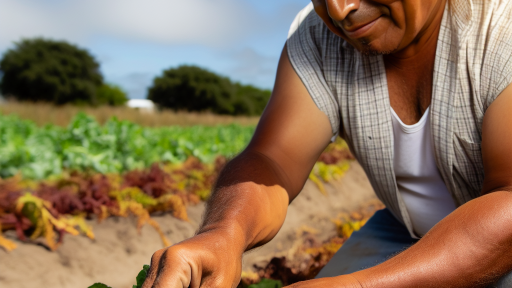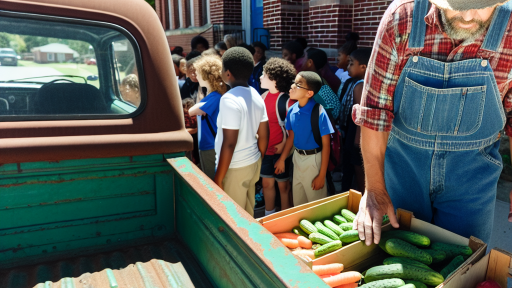Understanding the Benefits of Farm-School Partnerships
Enhancing Student Learning Experiences
Farm-school partnerships enrich student learning experiences through hands-on activities.
Students engage directly with agricultural practices and concepts.
This approach fosters a deeper understanding of food systems and sustainability.
Moreover, it encourages curiosity and inquiry-based learning.
Students gain practical skills that align with academic curricula.
In addition, these partnerships boost students’ environmental awareness.
Building Community Connections
Farm-school partnerships strengthen community ties between local farmers and schools.
Local farms provide valuable resources and knowledge to educators.
In turn, schools can promote local agricultural products.
This collaboration fosters a sense of community ownership and pride.
Furthermore, it supports local economies by bolstering farm revenues.
Through these connections, students learn the importance of community engagement.
Promoting Health and Nutrition
Farm-school partnerships emphasize the importance of healthy eating habits.
They introduce students to the source of their food and its nutritional value.
Farm visits allow students to enjoy fresh fruits and vegetables.
Transform Your Agribusiness
Unlock your farm's potential with expert advice tailored to your needs. Get actionable steps that drive real results.
Get StartedThis exposure encourages healthier food choices among students and their families.
Furthermore, these experiences can influence lifelong eating habits positively.
Ultimately, the partnership contributes to overall community health initiatives.
Encouraging Environmental Stewardship
These partnerships cultivate stewardship for the environment in students.
Students learn about sustainable farming practices firsthand.
This education aids in understanding ecological systems and biodiversity.
Engaging with farms highlights the importance of preserving natural resources.
Moreover, students are inspired to advocate for environmental issues.
Thus, farm-school partnerships play a vital role in shaping future leaders.
Identifying Common Goals and Values Between Farms and Schools
Promoting Healthy Eating
Both farms and schools share a commitment to promoting healthy eating.
Farmers grow fresh produce, while schools educate students about nutrition.
This collaboration inspires students to make healthier food choices.
Encouraging Environmental Stewardship
Environmental stewardship is a core value for both entities.
Farms practice sustainable methods, while schools teach respect for nature.
Joint efforts can enhance students’ understanding of ecological balance.
Supporting Local Economies
Farms and schools can boost local economies through partnerships.
By sourcing food locally, schools support farmers in their communities.
This creates a network of mutual support and economic growth.
Enhancing Community Engagement
Both farms and schools benefit from increased community engagement.
Schools can organize field trips to local farms to enrich learning experiences.
Farms can host educational workshops tailored for students and families.
Building Lifelong Skills
Partnerships foster the development of lifelong skills in students.
Students can learn gardening, cooking, and agricultural practices.
These skills encourage self-sufficiency and appreciation for food sources.
Showcase Your Farming Business
Publish your professional farming services profile on our blog for a one-time fee of $200 and reach a dedicated audience of farmers and agribusiness owners.
Publish Your ProfileCreating Value-Based Programs
Shared values help in creating programs that resonate with both groups.
Programs can focus on sustainability, health, and community well-being.
Collaborative initiatives strengthen the bond between farms and schools.
Strategies for Effective Communication and Collaboration
Establish Clear Communication Channels
Clear communication is essential for effective partnerships.
Both farms and schools should define preferred communication methods.
Regular meetings can foster open dialogue among stakeholders.
Utilizing email, phone calls, and messaging apps promotes timely communication.
It’s important to set communication expectations from the start.
Engage in Collaborative Planning
Collaboration starts with involving all stakeholders in planning.
Initial planning meetings can identify mutual goals and objectives.
Farmers and educators should outline shared priorities collaboratively.
Using tools like shared documents helps keep everyone on the same page.
Continuous participation enhances commitment and investment in the partnership.
Build Trust Through Transparency
Trust is built through transparency and honesty in communication.
Both parties should share relevant information openly and regularly.
Discuss challenges candidly to find solutions together.
Transparency in operations builds confidence among partners.
Regular updates on progress nurture the relationship over time.
Leverage Community Resources
Utilizing community resources strengthens partnerships significantly.
Schools and farms can access local organizations for support and guidance.
Collaborating with local governments can provide additional resources.
Engaging volunteers can enhance capabilities and foster community involvement.
Taking advantage of grants can help fund partnership initiatives.
Monitor and Evaluate Progress
Regular evaluations help assess the effectiveness of the partnership.
Setting key performance indicators enhances accountability.
Feedback sessions encourage continuous improvement and growth.
Documenting successes and challenges provides insights for future initiatives.
Adjustments based on evaluations ensure long-term sustainability of the partnership.
Uncover the Details: Companion Planting Ideas for Small-Scale Gardens
Involving the Community: Engaging Parents and Local Stakeholders
Understanding the Importance of Community Engagement
Community engagement fosters collaboration between schools and farms.
It enhances educational experiences for students.
Moreover, collaborative efforts benefit local economies.
Building Relationships with Parents
Effective communication is essential for engaging parents.
Schools can organize workshops to inform parents about farming initiatives.
Additionally, regular newsletters can update parents on activities.
These methods help parents feel involved in their children’s education.
Collaborating with Local Stakeholders
Schools should reach out to local farmers and agricultural experts.
Shared resources can enhance educational programs.
Partnerships with local businesses can provide funding opportunities.
Moreover, these collaborations create networking possibilities for everyone involved.
Showcase Your Farming Business
Publish your professional farming services profile on our blog for a one-time fee of $200 and reach a dedicated audience of farmers and agribusiness owners.
Publish Your ProfileUtilizing Community Events
Organizing community events brings everyone together.
Farmers’ markets and school fairs can highlight local produce.
These events allow students to interact with their local food systems.
Engaging activities can attract families and build community spirit.
Encouraging Volunteer Participation
Volunteers are crucial for strengthening farm-school partnerships.
Schools should create a volunteer program for parents and community members.
These programs can include field trips to local farms.
Parents can also help with classroom activities or gardening projects.
Ultimately, volunteer participation enriches the educational environment.
Discover More: Essential Tools for Direct-to-Consumer Farming
Designing Curriculum that Integrates Agricultural Education
Importance of Agricultural Education
Agricultural education fosters essential skills in students.
It enhances their understanding of food systems.
This education promotes awareness of sustainability practices.
Furthermore, it cultivates a sense of community involvement.
Curriculum Development Strategies
Integrating agricultural concepts into various subjects is crucial.
This integration ensures relevance and engagement for students.
Collaboration with local farms enhances educational experiences.
Additionally, hands-on activities benefit learning outcomes.
Incorporating Field Experiences
Field trips to farms provide real-world insights.
Students witness farming operations firsthand.
Moreover, these experiences deepen their appreciation for agriculture.
Utilizing Technology in Education
Technology plays a vital role in modern agriculture.
Incorporate tools like apps and online resources.
This approach makes learning interactive and fun.
Resource Collaboration
Partnering with local agricultural organizations is beneficial.
They can provide materials and expertise for classrooms.
Such partnerships enrich the curriculum significantly.
Developing Workshops and Training
Hosting workshops helps educators stay informed.
These sessions focus on current agricultural trends and practices.
Furthermore, they foster professional development among teachers.
Engaging the Community
Community involvement enhances curriculum effectiveness.
Invite local farmers to share their experiences in class.
Conduct community events that emphasize agricultural education.
Assessment and Evaluation
Assessing student understanding is essential for curriculum success.
Use varied assessment methods to gauge learning outcomes.
Feedback from students can guide future improvements.
Tracking Progress Over Time
Implement long-term projects to measure growth.
This approach allows students to apply knowledge practically.
Regular evaluations can highlight areas for enhancement.
Learn More: Sustainable Practices for Modern Small Farms
Showcase Your Farming Business
Publish your professional farming services profile on our blog for a one-time fee of $200 and reach a dedicated audience of farmers and agribusiness owners.
Publish Your Profile
Creating Opportunities for Hands-On Learning and Farm Visits
Importance of Hands-On Learning
Hands-on learning engages students in practical experiences.
It enhances comprehension of agricultural practices.
Moreover, it fosters a deeper appreciation for food sources.
Students retain knowledge better when they actively participate.
Thus, schools should prioritize experiential learning opportunities.
Facilitating Farm Visits
Farm visits provide students firsthand experience with agriculture.
These excursions encourage curiosity and inquiry.
Additionally, they promote relationship-building with local farmers.
Schools can collaborate with farms to create tailored visits.
Farmers can offer tours that highlight sustainable practices.
Integrating Curriculum with Farm Experiences
Teachers can design lessons around farm visits.
For example, science classes can focus on crop growth.
Math lessons can incorporate data collection from farms.
Language arts can include storytelling about farming life.
Such integration enhances learning relevance for students.
Creating Long-Term Partnerships
Schools should establish enduring partnerships with farms.
This approach benefits both students and the local agricultural community.
Regular collaborations ensure ongoing educational opportunities.
Additionally, they support local economies and sustainability.
Community involvement strengthens the bonds between farm and school.
See Related Content: Transition To Ethical Animal Farming
Evaluating the Impact of Partnerships on Student Outcomes
Importance of Partnerships
Strong partnerships between farms and schools significantly enhance student learning experiences.
Such collaborations expose students to real-world applications of classroom knowledge.
Additionally, partnerships can stimulate interest in agriculture and healthy eating.
Assessing Academic Performance
Data shows that students involved in farm programs often achieve better grades.
Furthermore, hands-on learning helps students grasp complex concepts more easily.
Research indicates a correlation between experiential learning and improved test scores.
Fostering Social Skills
Participating in partnerships encourages teamwork among students.
Students develop communication skills through collaborative projects.
This environment allows them to build relationships beyond classroom walls.
Enhancing Health Awareness
Farm-school initiatives promote awareness of healthy eating habits.
Students learn about the nutritional benefits of fresh produce.
Consequently, they are more likely to make healthier food choices.
Cultivating Environmental Stewardship
Such partnerships foster a sense of responsibility towards the environment.
Students engage in activities like planting and garden maintenance.
This hands-on experience nurtures a connection with nature and sustainability.
Community Engagement
Partnerships often involve local families and community members.
This interaction strengthens community ties and support for schools.
Engaged communities can provide valuable resources and assistance.
Sustaining Long-Term Partnerships: Challenges and Solutions
Identifying Common Goals
Strong partnerships require shared objectives between farms and schools.
Showcase Your Farming Business
Publish your professional farming services profile on our blog for a one-time fee of $200 and reach a dedicated audience of farmers and agribusiness owners.
Publish Your ProfileBoth parties must agree on what they want to achieve.
Establishing common goals fosters collaboration and unity.
This alignment helps in creating meaningful agricultural programs.
Addressing Resource Limitations
Many partnerships struggle with limited resources.
Both farms and schools may face budget constraints.
They need to be creative in utilizing available resources.
Grant applications and community fundraising can provide support.
Additionally, sharing resources can lead to cost savings.
Building Trust and Communication
Trust is fundamental for any long-lasting partnership.
Regular meetings improve communication and understanding.
Farms and schools should share successes and challenges openly.
Consistent feedback strengthens the relationship over time.
Engaging the Community
Community involvement plays a crucial role in sustaining partnerships.
Schools can organize events to showcase local farms.
Farms can host field trips to educate students.
These initiatives build public awareness and support.
Navigating Policy Changes
Partnerships must adapt to changing agricultural policies.
Schools should stay informed about new regulations impacting food sourcing.
Farms need to understand school nutrition standards and guidelines.
Flexibility in operations can help navigate these challenges.
Celebrating Achievements Together
It’s important to recognize milestones in partnerships.
Celebrating successes boosts morale and motivation.
Joint events showcase collaboration to the wider community.
These celebrations strengthen the bond between partners.
Additional Resources
This chef helped champion Sacramento’s Farm to Fork movement. –




